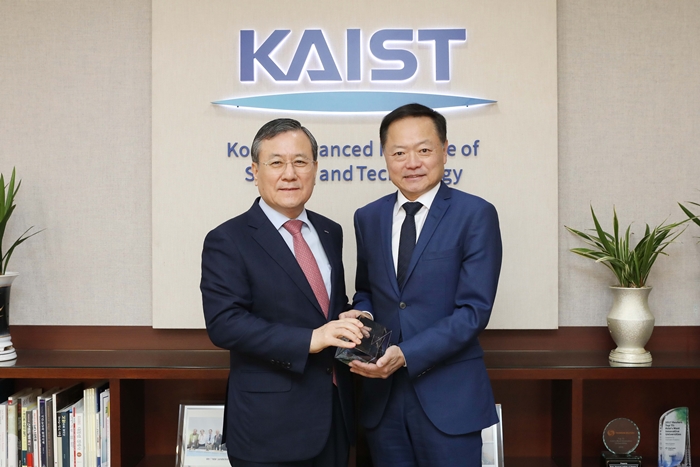event

< Director Steve Ahn (Right) >
Steve Ahn, the Director of Startup KAIST, donated one hundred million KRW of development fund to his alma mater KAIST to increase entrepreneurship opportunities and nourish start-up culture on campus. Professor Ahn founded Leadis Technology Inc. in 2000, a fabless semiconductor company based in Silicon Valley that develops mobile phone sub-display applications. Leadis Technology Inc. made its stock market debut on the NASDAQ in 2004.
“KAIST produces many start-ups, however, entrepreneurial culture has yet to become a growth engine of KAIST, compared to education and research. Through invigorating entrepreneurial spirit and revitalizing start-up activities, KAIST should reclaim its leadership role in creating decent jobs and fuelling economic growth and competitiveness at home and abroad,” he said during the donation ceremony last month.
He added, “I am forever grateful to my alma mater KAIST for having provided me with a quality education. It was a valuable asset that helped me gain an opportunity to nurture the up-and-coming, next-generation scholars as a professor at KAIST. I decided to make this donation hoping that KAIST students will be given more entrepreneurship opportunities, and a healthy start-up ecosystem will be accelerated beyond KAIST.”
Director Ahn earned his bachelor’s degree in metallurgy from Seoul National University, followed by a master’s degree in materials engineering from KAIST. He received another master's degree in electrical engineering, and was granted a doctorate in materials engineering from Stanford University.
He has been mentoring start-up activities at Startup KAIST since 2014, and serving as the principal professor at K-School since 2016. From these activities, he was recognized for his academic achievements and committed leadership, which led him to be appointed as the Director of Startup KAIST in March 2019.
(END)
-
research KAIST Secures Core Technology for Ultra-High-Resolution Image Sensors
A joint research team from Korea and the United States has developed next-generation, high-resolution image sensor technology with higher power efficiency and a smaller size compared to existing sensors. Notably, they have secured foundational technology for ultra-high-resolution shortwave infrared (SWIR) image sensors, an area currently dominated by Sony, paving the way for future market entry. KAIST (represented by President Kwang Hyung Lee) announced on the 20th of November that a research t
2024-11-22 -
event KAIST’s RAIBO2 becomes the World’s First Robo-dog to Successfully Complete a Full-course Marathon
KAIST's quadrupedal walking robot "RAIBO", which can run seamlessly on sandy beaches, has now evolved into "RAIBO2"and achieved the groundbreaking milestone by becomeing the world's first quadrupedal robot to successfully complete a full-course marathon in an official event. < Photo 1. A group photo of RAIBO2 and the team after completing the full-course marathon > KAIST (President Kwang Hyung Lee) announced on the 17th of November that Professor Je Min Hwangbo's research team of t
2024-11-17 -
research KAIST Unveils New Possibilities for Treating Intractable Brain Tumors
< Photo 1. (From left) Professor Heung Kyu Lee, KAIST Department of Biological Sciences, and Dr. Keun Bon Ku > Immunotherapy, which enhances the immune system's T cell response to eliminate cancer cells, has emerged as a key approach in cancer treatment. However, in the case of glioblastoma, an aggressive and treatment-resistant brain tumor, numerous clinical trials have failed to confirm their efficacy. Korean researchers have recently analyzed the mechanisms that cause T cell exhaus
2024-11-15 -
event KAIST’s Beach-Roaming Quadrupedal Robot “RAIBO” to Run a Marathon!
“RAIBO”, KAIST’s four-legged robot featuring remarkable agility even on challenging terrains like sandy beaches, is now set to be the first in the world to complete a full marathon. < Photo 1. A group photo of the research team of Professor Je Min Hwangbo (second from the right in the front row) of the Department of Mechanical Engineering who participated in the marathon event at 2024 Geumsan Insam Festival last September > On the 17th of November, KAIST (represen
2024-11-15 -
research KAIST Researchers Suggest an Extraordinary Alternative to Petroleum-based PET - Bacteria!
< (From left) Dr. Cindy Pricilia, Ph.D. Candidate Cheon Woo Moon, Distinguished Professor Sang Yup Lee > Currently, the world is suffering from environmental problems caused by plastic waste. The KAIST research team has succeeded in producing a microbial-based plastic that is biodegradable and can replace existing PET bottles, making it a hot topic. Our university announced on the 7th of November that the research team of Distinguished Professor Sang Yup Lee of the Department of Ch
2024-11-08